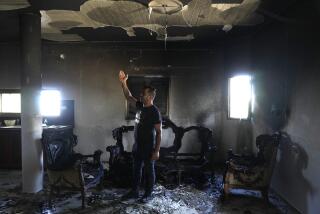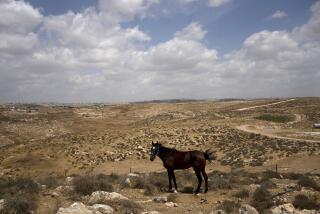Angry Settlers Warn Rabin of Jewish Rebellion
- Share via
JERUSALEM — Israeli settlers, enraged by the murder of a 23-year-old Jew by Islamic militants, blocked roads in the occupied West Bank and stoned Palestinian cars Sunday for the third straight day, bringing warnings that the protests could turn into a full-fledged rebellion against the government of Prime Minister Yitzhak Rabin and its agreement on Palestinian autonomy.
With burning tires, overturned cars and large boulders rolled down from hilltops, the settlers built barricades on the major West Bank roads running north from Jerusalem and east from Tel Aviv, paralyzing traffic through much of the region.
Other groups stoned Palestinian cars, trucks and buses as they passed near Israeli settlements in the territory, and some set Arab vehicles on fire in local towns.
Today, the main settlers group, Yesha, plans to blockade 48 of the largest Arab villages for three hours in the morning to prevent Palestinian villagers from going to work, many to jobs in Israel, in a further escalation of the growing confrontation between Israelis and Palestinians.
“If an Arab intifada (rebellion) can bring about an Arab state, then perhaps a Jewish intifada can bring about a Jewish state,” Aharon Domb, a Yesha leader, said, referring to the settlers’ hopes to block Palestinian self-government in the West Bank and promote the territory’s incorporation into Israel.
Two Palestinians were killed in separate incidents Sunday--one when he reportedly attacked an Israeli manager of a garage in the Gaza Strip, the other when the car in which he was riding crashed through an army checkpoint near the West Bank town of Qalqiliya and the soldiers opened fire.
The settlers’ actions drew sharp criticism from Rabin, who compared them with members of the Islamic Resistance Movement, known as Hamas, in their desire to undermine the agreement on Palestinian autonomy, and from Cabinet members who saw the challenge to government authority as seditious.
“We who always condemn those who spill Jewish blood because it is Jewish, we are now suddenly setting Arab cars on fire because they are Arab,” Tourism Minister Uzi Baram said after the weekly Cabinet meeting.
“The government must act against loathsome murders, but at the same time it must put a stop to the rebellion of the (Israeli) residents of the territories.”
Yossi Sarid, the environment minister from the dovish Meretz Party, sympathized with the settlers over the murder Friday of Haim Mizrahi, a resident from the Beit El settlement north of Jerusalem who was abducted while buying eggs from a Palestinian chicken farmer in a neighboring village.
“I understand the sorrow of the settlers, and one doesn’t have to be a settler to feel that sorrow,” Sarid said. “But what the settlers are doing (in the current protests) is not out of sorrow, but a settling of accounts with the government--they want the government’s peace plan to fail.”
But the settlers’ anger was aroused further by Rabin’s weekend comment lumping the settlers together with Hamas as opponents of Israel’s agreement with the Palestine Liberation Organization on Palestinian self-government.
“Palestinian Arabs murdered on Friday a resident of Beit El only because he was Jewish,” Rabin said. “Jewish opponents rioted afterward and damaged Arab cars only because they were Arab.
“And opposite these--definitely opposite the enemies, the murderers, but also opposite the opposers who are bold enough to riot--it is our obligation to overcome them. Everyone in his domain, everyone in the area of his responsibility.”
Benjamin Netanyahu, chairman of the opposition Likud Party, called Rabin’s statement “a scandal,” declaring, “If Rabin and his government are incapable of defending Jewish lives, they should resign and give their places to those who can.”
But Economics Minister Shimon Shetreet, the Cabinet’s hawk, said Rabin did not intend to portray the settlers as “brutal murderers” like Hamas.
“I think he was referring to the impact and effect of violent activities,” Shetreet said. “The impact, in fact, has similar effects regarding opposition to the peace process. But I do not think he intended to compare brutal murder to violence which emanated from the anger.”
Baram said that the government needs to move quickly to deal with the protests precisely because of the danger they pose to the peace agreement. “This is an instigating step . . . aimed at torpedoing the peace process,” he said. “If the government remains indifferent to the issue, it will be a big mistake.”
Foreign Minister Shimon Peres added, “The government . . . will not allow others to take the law into their own hands.”
On Saturday, several hundred settlers rampaged through the West Bank towns of Ramallah and El Bireh north of Jerusalem, stoning and setting fire to Palestinian homes and cars and fighting with Israeli soldiers and police trying to restore order. Thousands more demonstrated along the major roads throughout the region. They had also stoned Arab cars and burned several on Friday.
The protests over Mizrahi also reflected the settlers’ general anxiety over Palestinian self-government, their fears about their own safety and their anger over the Rabin government’s retreat from the West Bank and Gaza Strip, which many consider to be part of the biblical Land of Israel. More than 125,000 Israelis, encouraged by previous governments, have settled in the territories, which Israel captured in the 1967 Middle East War.
Hamas, which has declared that it will continue killing Israelis in the West Bank despite the peace agreement between Israel and the Palestinians, took responsibility for Mizrahi’s murder. In a statement Sunday, the group demanded the release of its leader, Sheik Ahmed Yassin, and threatened more attacks if Israel does not free him. Last Sunday, Hamas killed two Israeli soldiers in the Gaza Strip.
More to Read
Sign up for Essential California
The most important California stories and recommendations in your inbox every morning.
You may occasionally receive promotional content from the Los Angeles Times.










